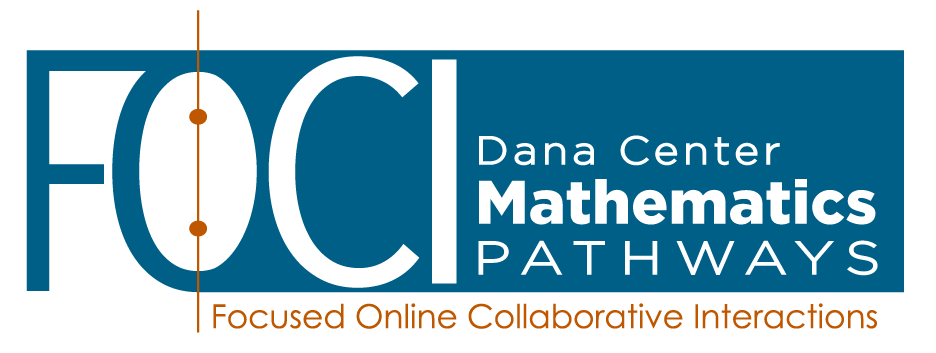Are you new to statistics instruction and interested in creating a student-centered learning environment? Are you a veteran statistics instructor looking to update your teaching practice? Are you designing a corequisite support course to accompany the introductory statistics course?
Are you looking for a support group of peers and other statistics education leaders? Are you willing to try out new classroom techniques?
If you answered “yes” to any of these questions, we invite you to participate in the Dana Center Mathematics Pathways’ professional learning opportunity:

Series 7: Strengthening Conceptual Understanding in Introductory Statistics
Incorporating active and inclusive teaching and learning strategies (for in-person or virtual settings)
In this series of six sessions, you will examine strategies for engaging students with the foundational concepts of a modern introductory statistics course, and explore equity-minded strategies that deepen students’ conceptual understanding. This series is appropriate for instructors of in-person and virtual classes as well as for those designing statistics corequisite support courses.
Series sessions are highly interactive and take place online via Zoom video conferencing technology – so there is no travel required to participate!
You’ll work with a cohort of peers in large and small groups to learn together. Facilitators from the Charles A. Dana Center will guide each session and ensure that you have all of the tools and support you need to apply your knowledge effectively in the classroom.
This professional learning opportunity is provided at no charge to mathematics and statistics faculty and those teaching statistics support courses.
See page 3 for session descriptions
Two new cohorts now open!
| Day: Tuesdays Time: 3:00 – 5:00 pm ET Dates: Feb 8, Feb 22, Mar 8, Mar 22, Apr 5, Apr 19 Deadline to register is 12:59 pm on Feb 1 | Day: Wednesdays Time: 3:00 – 5:00 pm ET Dates: Feb 9, Feb 23, Mar 9, Mar 23, Apr 6, Apr 20 Deadline to register is 12:59 pm on Feb. 2 |
Register for either cohort at:
https://app.smartsheet.com/b/publish?EQBCT=d1f519e18c6e439e895f80a1e427f21c
| What am I committing to? | |
| Actively participating in the full series of 6 sessions (12 total hours) | In each 2-hour session, we will use authentic situations to explore, struggle with, and make sense of pedagogical and content challenges. Session delivery uses the video and audio features of Zoom. This technology enables us to converse “face-to-face” in real time in large and small groups, without the expense and hassle of traveling to a central location. |
| Preparing for each session and trying new ideas in your own classroom after each session | Prior to each session, you are expected to do a limited amount of preparation work, often a short reading, video viewing, document analysis, and/or personal reflection.After each session, you commit to trying a technique or approach we discussed during the session. |
| Contributing to the large and small group discussions; supporting your peers on this learning journey | Contribute in the large and small group discussions, bringing your own perspectives and prior experiences into the conversations.Collegially engage in conversations and application activities focused on deepening student understanding through effective student discourse and collaboration. |
| What support will I get from the Dana Center? | |
| FOCI materials | You will receive high-quality, well-researched, and thoughtful materials for the entire series. All session materials (readings, reflections, handouts, and PowerPoints) will be provided. You will also have access to recordings of the sessions so that you can review the content on your own. |
| Support from trained facilitators | Dana Center curriculum and professional learning specialists will lead the sessions. These individuals are available to answer questions and provide support during and between the sessions. They can address content and application questions as well as technology issues (e.g., the Zoom platform). |
| Certificate of Completion | You will receive a certificate of completion at the end of the series that may be submitted with tenure or promotion materials for your department. The topics and number of hours of professional learning you completed will be included. |
| Do I need any previous knowledge of statistics or active and inclusive pedagogy to participate? |
| No previous knowledge is required! This series will provide an introduction to active and inclusive pedagogies within the context of foundational statistics concepts. A sample of learning outcomes for each session in the series is given on the next page. |
| FOCI Series 7: Strengthening Conceptual Understanding in Introductory Statistics Incorporating active and inclusive teaching and learning strategies (for in-person or virtual settings) Session 1: Guiding Student Thinking about Implications of Data Collection Participants will: * Establish a safe, supportive, participant-centered learning environment for the cohort and set goals for participation and growth. * Explore types of statistical studies. * Engage in activities that illustrate various types of biases and potential confounding variables in the context of a statistical study. * Consider how to develop understanding of the relationship between study design and the types of conclusions that are appropriate. Session 2: Developing Student Understanding of Sampling Variability Participants will: * Use simulation to explore sampling variability. * Consider ways to motivate understanding of sampling distributions and how a sampling distribution provides information about the long-run behavior of a sample statistic. * Reflect on ways to develop conceptual understanding of statistical inference. Session 3: Fostering Understanding of Statistical Significance and Practical Significance Participants will: * See how an activity can be used to develop a conceptual understanding of hypothesis testing and p-values. * Engage in an activity that develops understanding of “statistically significantly different.” * Explore the meaning of statistical significance and of practical significance, and understand the difference between them. Session 4: Building a Foundation for Selecting Appropriate Data Analysis Methods and Graphical Displays Participants will: * Consider how an understanding of basic statistical terms, including population, parameter, sample, statistics, and variable types, provides a foundation for data analysis methods. * Engage in activities that allow students to focus on selecting methods of analysis appropriate for a given research question. * Explore how understanding of variable types in a dataset equips students for choosing suitable graphical displays. Session 5: Providing Experience with Describing Relationships and Building Linear Prediction Models Participants will: * Experience activities that use applets to develop an understanding of correlation and least squares regression. * Build linear regression models and assess their usefulness for making predictions. * Explore the difference between a statistical relationship and a cause-and-effect relationship. Session 6: Developing Conceptual Understanding of Probability and Addressing Probability Misconceptions Participants will: * Consider ways to help students develop the ability to communicate effectively using probabilities. * Explore common student probability misconceptions and discuss ways to address them. * Plan for next steps. |
